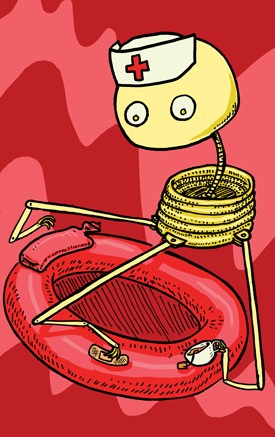Oct. 28, 2205
This morning, the World Health Organization (WHO) announced a landmark in the field of medicine: humanity has beaten death.
Humans have fought against death for some time. Different societies practiced different forms of medicine, sure, but the end goal has always been to prolong life.
Medicine advanced tremendously in the 20th and 21st centuries. Physicians and nurses found new ways to save lives by using groundbreaking discoveries made by medical scientists.
Countless individuals aspired to become physicians, attracted to the prestige, money, and power associated with the profession.
But somewhere along the way medical professionals lost sight of what they were working towards.
No one was asking medicine’s big philosophical question. Nobody was asking what the end goal of medicine truly was.
It is clear today, in the wake of WHO’s announcement, that the answer to that question is eternal life.
Gone are the days of “old age,” a time when things like cancer and dementia easily stole our bodies and minds.
Experts have predicted the conquering of death for quite a while now. The potential for this shift in human existence was first noted when medical scientists and physicians successfully overcame the process of aging. By genetically altering our biological clocks, processes like cancer and tissue wasting were permanently prevented.
Although the biological degradation associated with aging was halted, things were not perfect. There was a mental disconnect between our bodies and minds that allowed for things like dementia and depression to cause more suffering than ever before.
Despite our physical wellness, the suicide rate had actually increased in the mid-to-late-22nd century.
Medical researchers and professionals worked diligently to bring our level of mental health care to the same level that physical health care had achieved. Eventually the HappyHub, a brain implant which provides our brains with biochemicals when our normal levels fall out of balance, was developed.
The last piece of the puzzle was defeating infectious diseases. Pathogenic bacteria and viruses have always proved to be a daunting challenge for us as humans due to our differences in biology. Bacteria and viruses reproduce much more rapidly than we do, so no matter how quickly we adapted, they were always one step ahead of us.
This problem was solved when medical researchers realized that instead of attacking these pathogens, we should be improving our defences. To achieve this, researchers developed a way to improve the efficiency of our immune systems through the use of specialized nanobots.
Our nanobot-bolstered immune systems are now so adept at fighting off infections that it was only a matter of time before every single human pathogen would be wiped out.
The WHO’s announcement this morning came after confirmation that the common cold, humanity’s last known infectious disease, had been eradicated.
Today, physical and mental health has progressed so far that the global suicide rate has dropped to a fraction of what it used to be. Infectious diseases are no longer a concern. Suffering is a concept that will hopefully be forgotten over time.
Sure, people can still die in freak accidents, but current health and safety technologies make those scenarios nearly impossible. For instance, we no longer have to worry about murder or assault due to the DePROVOKER chips that are inserted into our brains alongside our HappyHubs shortly after birth.
Death is a thing of the past, and I couldn’t be more excited about it. Let’s marvel at what this means for all of us moving forward into the forever-future.
Unlimited time means that everybody has the opportunity to learn and do everything. Experts believe that every single individual will have mastered all skills and fields of knowledge within the next five hundred years. Eternal life has given us the opportunity to end natural inequality at the small expense of individualism.
In just a few hundred years, everybody will be the exact same.
What happens after that is anybody’s guess, but I’m sure we will figure out new things to explore as a collective entity.
The WHO made another major announcement during this morning’s press conference. The Global Reproductive Restriction, which was established at the beginning of the 22nd century to combat the unsustainable growth of our global population, has officially ended.
Instead, it has been replaced with the Global Reproductive Prohibition. New generations of humans are no longer needed since there will no longer be deceased individuals to replace. As a result, the current generation of children will be the final generation of new humans. Mandatory sterilization for all individuals will be implemented within the next few months. Once this generation reaches adulthood, it is very likely that most family structures will be dissolved.
I think these personal sacrifices are an extremely fair payoff for the opportunity to live forever. Only time will tell what humanity accomplishes next.

